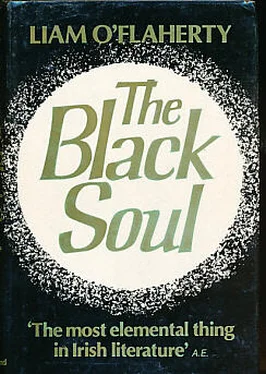He looked at her through the mist that the whisky raised before his eyes, and thought that she was a cocotte ogling him. He could see her only at a far distance. Between his eyes and hers there were a host of visions – his mother, his father, his youth that was pure, his debauched manhood, and the horrors of war. All these visions told him that she was a cocotte , ‘like all women,’ that she would look at all men as she looked at him. Beyond these visions was the beauty of her sad eyes and her swelling white throat. That beauty attracted him. But his soul, enraged with his sordid past, hissed at the beauty and scowled, persuading itself that the woman was repulsive, ‘like all women.’
‘I won’t let the slut drag me back to life,’ he muttered, savagely eating his griddle cake.
And Little Mary moved about the kitchen excitedly, watching him without looking at him.
‘He has trouble on his mind,’ she thought. ‘I will wait. Wait, wait, wait for ever.’
The Stranger finished his meal and sat again in front of the fire. Little Mary cleared the table and sat in the corner beside him looking into the fire. And then he began to feel her presence drawing him towards her again. His mind was bored. It was his body that was excited. It was an ugly excitement that filled his mind with repulsion. He struggled against it, but it remained. Then he looked at her with the look in his eyes that all men had when they looked at her. She shuddered. The accumulated passion of years was burning in her and she was eager for his love. And yet she began to feel afraid. She did not see the light of love in his eyes. She wanted him for ever. And that hot passion in his face was like what she saw in all men’s faces. It was lust. He had arisen from his stool and was moving slowly towards her, his hands shaking.
‘No, no,’ she cried with her lips, as her body moved towards his. ‘No, no. I … I … don’t.’
He swore as he grasped her shoulders, and then there was a loud roar that sent them both to their feet gasping.
The cabin shook. Thunder crashed across the heavens. The slits between the boards on the windows were bright with the forked lightning. The sound came rumbling from east to west louder and louder, as if each peal gave birth in its passage to a peal louder than itself. Through the sound of the thunder came the screech of the wind. And the sea roared monotonously like a hungry lion. The air was full of sound.
The Stranger stood transfixed by the fire. Little Mary stood beside him looking up at him, careless of the storm. Then she threw her arms around his neck and pressed close to him feigning fear.
‘Protect me,’ she murmured.
He thrust her gently from him and went to the centre of the floor, trembling. He felt that the thunder had clapped as a warning to him. It warned him against falling a victim to passion. So God might have warned a hermit monk of old. He became full of self-pity. He told himself that the whole world was in arms against him, dragging him back again into the torture from which he had fled. Even here, to the desolate bleak fastness of Rooruck, the wickedness of the world had pursued him. These passions and desires of the flesh were ugly and futile. Passion belonged to young men, full of the enthusiasm of youth. It belonged to the chattering mob. He was dead to it. He had heaped huge rocks on its grave.
‘Ye-ah,’ he said, baring his teeth. A demoniac look came into his eyes. Then his stomach turned. He went stumbling to the door and out into the night.
Little Mary dropped into her seat by the fire. Her bosom heaved with sobs. She bit her finger, trying to think what was the matter with her. Her body felt as if pins were being stuck through every pore of her skin. The soles of her feet itched. ‘Virgin Mary,’ she kept saying, ‘what is coming over me? I love him, I love him.’
She could not look at him when he came in. She wanted to be alone with this wonderful thing that had seized her body. She wanted to master it.
He stood at the door dripping with rain, his black hair in a matted mass about his face. Nothing of his face was visible but his bloodshot black eyes staring wildly. His bosom heaved as he hiccupped. Then he stumbled to his room, tore off his clothes, and fell on the bed. In a moment he was fast asleep. His passion died and left him as helpless as death, for in winter all things die that live in summer.
But even in winter, morning brings life and motion. It is a glorious motion to the strong, that winter movement of life in Inverara. It makes the body feel clean and the mind strong, as if it were bound with laths of steel. But for the weak, of body or of mind, it is a torture. The sun rose in the east, dim and sour, with a veil over its face. It sank again in the west without warming the earth. The birds were silent, hiding in their holes, or fled to the mainland over the sea, sitting on the masts of ships, searching the south and the sun. The sea moved mightily. At times it rested, green and bilious, between two battles. And the wind whined when the sea was resting. Everywhere in Inverara there was death on the ground and above it. The people went about clad in their heavy frieze, talking in low voices. At night they sat in the shebeens and around their own hearths telling stories of wrecks and drowning and death. Even sin had fled, for sin is born of the languorous passion of summer, and of the cold gritty breezes of spring.
Little Mary, her soul strong like the fierce soul of winter, was happy. She had found a man to love. He had spurned her. What of it? So did the sea spurn in winter and caress in spring and love in summer. What of it? She sang as she milked her cow in the morning. She sang as she went to the village well for water. The peasant women noticed her joy and began to whisper among themselves and point fingers at her. ‘O wife of Red John,’ they would say to her, with mock anxiety and a vicious gleam in their eyes, ‘what kind of man is he who is lodging in your house?’ ‘They say he is mad from the wars; beware of him,’ whispered another. ‘How handsome he is! Does he talk to you nicely?’ whispered another. And they would all laugh. And Little Mary, careless of their chatter, would throw back her head and laugh, her throat swelling like the throat of a singing thrush. Her husband began to look fearfully at her and say to himself, ‘What has come to the woman? Eh, Red John, what has come to her?’
To the Stranger those days were a torture. Afterwards they remained only as a blur on his memory, the blur that rises before the mind when the fumes of chloroform are sucked up the nostrils as if mountains were crowding up to crush one’s life, with loud awe-inspiring sounds. In the morning he would walk up and down the crag overlooking the Hill of Fate. His figure stooped. His head was thrust forward between his shoulders. His lips were compressed. There was a scowl on his face that terrified people who saw him. Often the small boys of the village peeped at him through the holes in the stone fence that runs parallel to the cliff. But their mothers would drive them away saying, ‘Lord have mercy on us. It’s a curse is on his soul. Father Shannon, may God be good to the poor man, was the same way after they unfrocked him.’
Then another terrific night of storm came. A Norwegian barque was wrecked off the Head of Crom and all her crew were drowned. Sheep and goats were killed on the crags by the storm. The bleak morning saw the peasants of Rooruck quarrelling on the shore, up to their necks in the huge breakers, grabbing at the planks and spars of the wrecked ship. The Stranger watched them, horrified, watching the living looting the house of the dead. Then he strode eastward to the cliffs. The storm of the night still raged. The salt spray whirled past him, climbing the two hundred feet from the sea in one light leap. The thundering waves rolled beneath madly. They rolled gaily, advancing, retreating, rising and falling with the rhythm of an orchestra. He was seized with their madness. He walked up and down the cliff revelling in it. The sea and the wind were mad, and he felt that he too was mad with them. They were committing suicide in their madness. So would he. But as soon as the thought came it terrified him. When he looked down through the spray at the white foam on the dark heaving bellies of the sea, he thought they were grinning at him. And he fled back to the cabin.
Читать дальше












